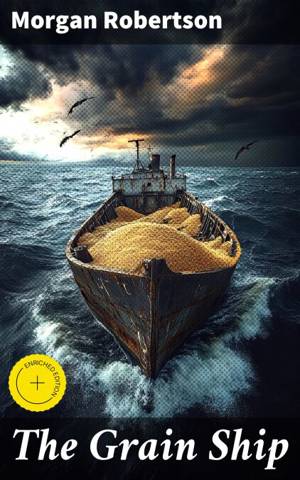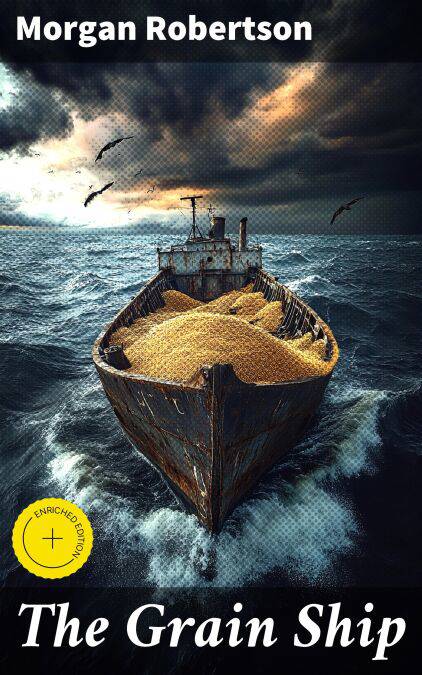
Bedankt voor het vertrouwen het afgelopen jaar! Om jou te bedanken bieden we GRATIS verzending (in België) aan op alles gedurende de hele maand januari.
- Afhalen na 1 uur in een winkel met voorraad
- In januari gratis thuislevering in België
- Ruim aanbod met 7 miljoen producten
Bedankt voor het vertrouwen het afgelopen jaar! Om jou te bedanken bieden we GRATIS verzending (in België) aan op alles gedurende de hele maand januari.
- Afhalen na 1 uur in een winkel met voorraad
- In januari gratis thuislevering in België
- Ruim aanbod met 7 miljoen producten
Zoeken
The Grain Ship E-BOOK
Enriched edition. Navigating the Treacherous Waters of Maritime Adventure
Morgan Robertson
E-book | Engels
€ 1,99
+ 1 punten
Uitvoering
Omschrijving
In Morgan Robertson's haunting novella, "The Grain Ship," readers are drawn into a world that intricately weaves themes of fate and the human spirit through the lens of maritime tragedy. The narrative unfolds aboard a ship laden with grain, isolated in the vastness of the ocean. Robertson's literary style is marked by vivid imagery and an evocative prose that captures the visceral essence of life at sea, reflecting the existential dread that looms over his characters. In the context of early 20th-century American literature, Robertson's work echoes the precursors of existentialism, grappling with the inexplicable forces that govern human existence amidst a relentless natural world. Morgan Robertson, a sailor turned author, was profoundly influenced by his own experiences at sea, infusing his writing with authenticity and a deep understanding of maritime life. Born in 1861 in a working-class family, Robertson's struggles with societal norms and his fascination with the ocean profoundly shaped his worldview. His earlier works, often foretelling disasters, display a unique ability to blend fiction with prescient themes, as seen in his famous novella "Futility," which anticipated the sinking of the Titanic. This compelling novella is a must-read for those who appreciate literary explorations of destiny and the human condition. Its richly layered narrative invites reflection on the unpredictability of life, making "The Grain Ship" an essential addition to any literary collection.
In this enriched edition, we have carefully created added value for your reading experience:
- A succinct Introduction situates the work's timeless appeal and themes.
- The Synopsis outlines the central plot, highlighting key developments without spoiling critical twists.
- A detailed Historical Context immerses you in the era's events and influences that shaped the writing.
- A thorough Analysis dissects symbols, motifs, and character arcs to unearth underlying meanings.
- Reflection questions prompt you to engage personally with the work's messages, connecting them to modern life.
- Hand‐picked Memorable Quotes shine a spotlight on moments of literary brilliance.
- Interactive footnotes clarify unusual references, historical allusions, and archaic phrases for an effortless, more informed read.
In this enriched edition, we have carefully created added value for your reading experience:
- A succinct Introduction situates the work's timeless appeal and themes.
- The Synopsis outlines the central plot, highlighting key developments without spoiling critical twists.
- A detailed Historical Context immerses you in the era's events and influences that shaped the writing.
- A thorough Analysis dissects symbols, motifs, and character arcs to unearth underlying meanings.
- Reflection questions prompt you to engage personally with the work's messages, connecting them to modern life.
- Hand‐picked Memorable Quotes shine a spotlight on moments of literary brilliance.
- Interactive footnotes clarify unusual references, historical allusions, and archaic phrases for an effortless, more informed read.
Specificaties
Betrokkenen
- Auteur(s):
- Uitgeverij:
Inhoud
- Aantal bladzijden:
- 215
- Taal:
- Engels
Eigenschappen
- Productcode (EAN):
- 4064066224189
- Verschijningsdatum:
- 9/12/2019
- Uitvoering:
- E-book
- Beveiligd met:
- Digital watermarking
- Formaat:
- ePub

Alleen bij Standaard Boekhandel
+ 1 punten op je klantenkaart van Standaard Boekhandel
Beoordelingen
We publiceren alleen reviews die voldoen aan de voorwaarden voor reviews. Bekijk onze voorwaarden voor reviews.









